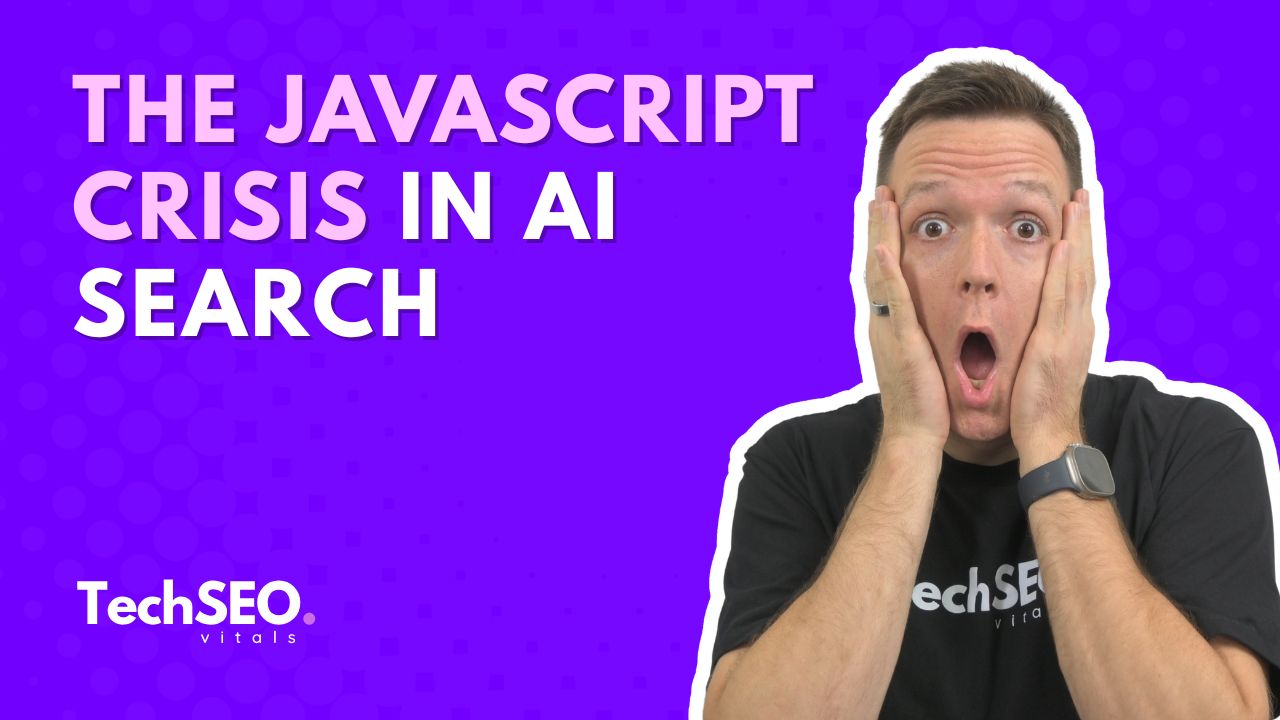The JavaScript Crisis in AI Search
AI search engines can not see your JavaScript content. The fix is simpler than you think.

AI search engines can not see your JavaScript content. The fix is simpler than you think.

It's been over a year since we've known that most LLM and AI search engines don't render JavaScript when they crawl our websites. ChatGPT, Claude, and Perplexity simply skip JavaScript entirely.
I first wrote about this on LinkedIn last year. However, not much has changed since then.
Every day, I visit websites that rely entirely on JavaScript rendering. Their owners don't realize they need server-side rendering at a minimum.
Ideally, they should build versions with minimal JavaScript and CSS.
Without these changes, they'll never appear in AI search results.
With the right optimizations, you can transform a website that takes ten seconds to load into one that loads in a few hundred milliseconds and is fully ready for AI Search.
Sites that once received zero clicks from AI search can now enjoy reasonable traffic from both AI and traditional search engines.
This traffic translates directly into revenue.
JavaScript-heavy websites exist many times in a state of clinical death.
They're slowly disappearing from human eyes.
ChatGPT will never use content from these sites. Claude won't either.
Google has adapted over the years, but at significant cost.
They spend enormous resources crawling JavaScript-rendered sites, which limits how many pages they can process in any given timeframe.
If you're trying to index large numbers of pages, you'll face this exact problem.
The only solution is to speed up your website or significantly reduce the number of pages that need indexing.
Google eventually gave up fighting website owners and started rendering JavaScript.
New companies like OpenAI and Anthropic have no reason to follow Google. The internet has enough accessible data without your JavaScript-heavy site.
Jono Alderson recently wrote an excellent blog post suggesting that AI tools might create a shared list of slow, unpredictable websites to ignore in the future.
This would work similarly to the current lists of malware and phishing sites they already share.
For these companies, the math is simple.
A fast, server-rendered website is more cost-efficient.
They can crawl 50 properly built pages in the time it takes to render one slow, client-side page.
It's purely economics.
The economics work both ways.
If your website doesn't get AI search traffic, you're losing money. Not money from your wallet, but money you could be earning.
Over the years, we've started treating websites like complex applications.
We implement features nobody needs.
Users might accept a five-second load time for a complex app.
For a website, that same wait time is unacceptable.
Visitors won't watch blank pages or loading spinners. They'll simply leave.
We now serve a generation raised on TikTok and Instagram Reels.
They'll abandon your business website if it takes more than two or three seconds to load.
So, start treating websites as websites, not applications.
Your goal should be full page loads within 2.5 seconds.
Even one second is realistic for 99% of websites.
Critics will say this is either impossible or too hard.
Yes, optimization requires resources and investment. But if you don't make these changes, your site will disappear from the internet's memory.
Websites must be fast, responsive, and stable.
They can't behave like caffeinated squirrels jumping unpredictably around.
To business owners and marketers, I have one message: Act now. Tomorrow may be too late.
ChatGPT, Claude, Perplexity, and other AI search tools won't forgive fundamental website design flaws.
I'm talking about structure and infrastructure, not just visual design, though that matters too.
Start by reviewing your website.
Identify opportunities to meet the standards that have been present all along but are now important to follow.
Remember, you're not making these changes just for crawlers.
At the end of the day, there's always a real person who wants to visit your website, buy your product, or use your services.
Make their experience worth their time.

Technical SEO & Web Performance Consultant
With 10+ years building and optimizing websites, I've learned that technical excellence drives business success. I help companies maximize their website's potential through strategic technical SEO and performance improvements that create better experiences for users and stronger results for businesses.
Get actionable strategies that help business owners and developers create exceptional user experiences, optimize technical SEO and performance, and drive revenue growth.



No spam, ever. Unsubscribe at any time.
By subscribing, I agree to the Privacy Policy and Terms and Conditions.
Get Free Technical SEO & Web Performance Tips